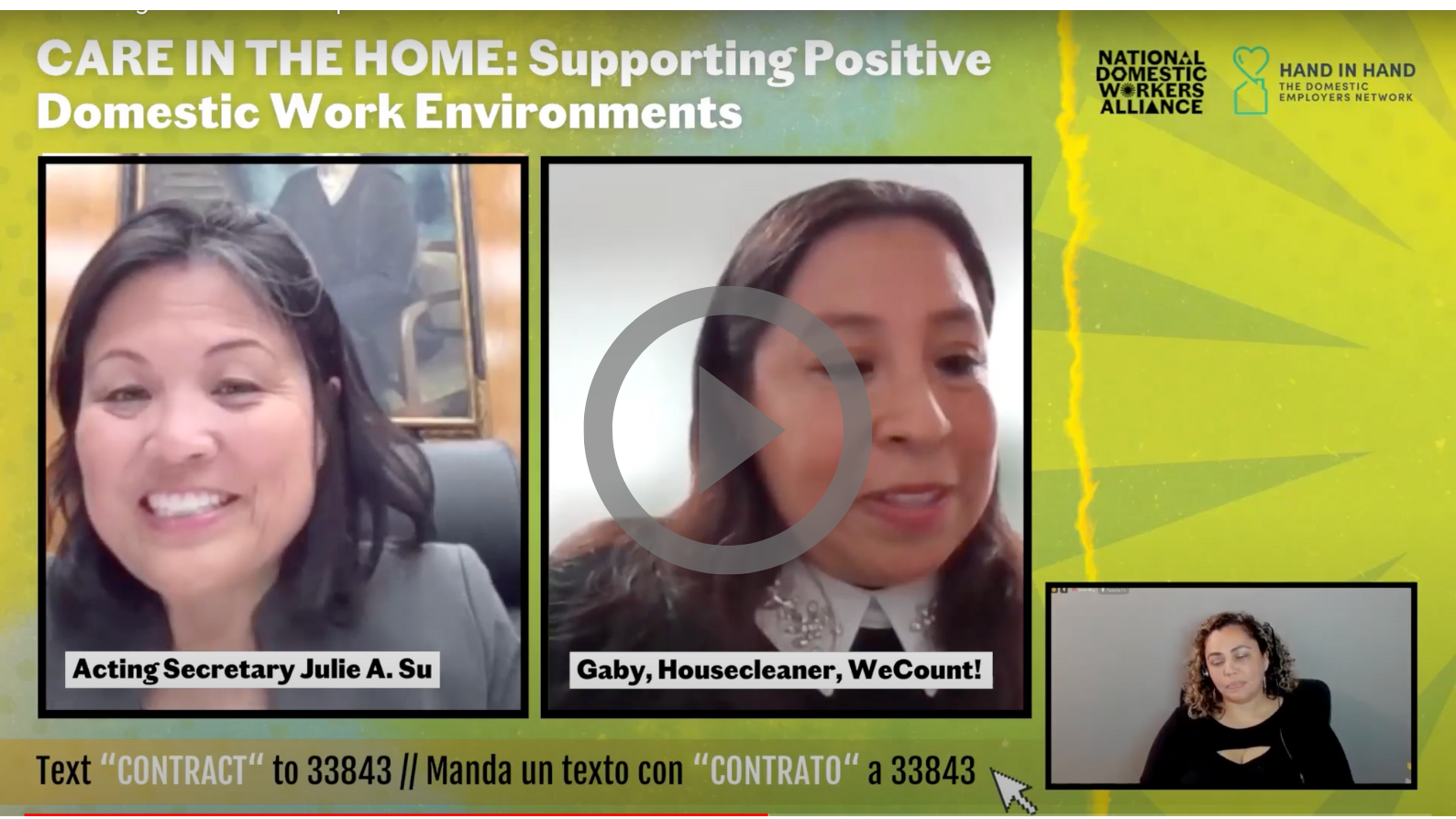FOR IMMEDIATE RELEASE: December 12, 2023
CONTACT: Daniela Perez, dperez@domesticworkers.org
ICYMI:
Department of Labor Joins Virtual Event with National Domestic Workers Alliance and Hand-in-Hand
The event focused on the Department of Labor’s recent release of sample employment agreements for domestic and care workers
WASHINGTON – On Monday, December 11, Acting Labor Secretary Julie Su joined a virtual event hosted by the National Domestic Workers Alliance and Hand-in-Hand, “Care in the Home: Supporting Positive Domestic Work Environment,” to celebrate the Department’s recent release of written sample agreements for domestic workers. The event featured a conversation between Acting Secretary Su, domestic workers, and domestic worker employers.
NDWA’s President Ai-jen Poo and Executive Director Jenn Stowe, and Stacy Kono, Executive Director of Hand-in-Hand, also attended and facilitated the virtual event.

The full event can be found on NDWA’s YouTube channel. Above, Acting Secretary Julie A. Su speaks with Gaby, a Housecleaner and NDWA affiliate WeCount! Member, on how sample agreements will support domestic workers like her.
Bonnie Okoth, a nanny and NDWA’s We Dream in Black (WeDiB) Chapter member, shared with Acting Secretary Su, “As a nanny, my journey has taught me self-worth and the importance of fair working conditions. When I started, I was unaware of the norms around fair wages or contracts. My first employment was challenging – I faced deceit about the number of children, including one with special needs, and was expected to work without breaks or a clear schedule. I lived under strict control, with limited personal freedoms, and received incredibly low pay. It was a struggle to meet even my basic needs. The final straw came when a new worker, treated differently due to her race and background, joined us. This blatant inequality made me realize the exploitation I faced as an immigrant and a person of color.” Okoth continued, “Joining NDWA was a turning point. It gave me the courage to stand up for myself, leading to my dismissal when I asked for a raise. But this experience was invaluable. With my next employer, I ensured clear, written goals were set. Although not a formal contract, it significantly improved my working conditions. The DOL’s decision to release a sample contract is a monumental step forward for domestic workers and nannies like me. Having a resource to guide and protect us is a personal victory, but a collective triumph for all in our profession. It’s a testament to the power of awareness and advocacy, and I am proud to be part of this change.”
On November 2, Acting Labor Secretary Su announced the Department of Labor’s sample employment agreement at the inaugural CareFest Convention at the UCLA Luskin Center. These documents provide a framework for employment conditions, including job responsibilities, compensation, benefits, work schedules, health and safety standards, and termination policies. These agreements, available for housecleaners, home care workers, and nannies, can be a vital resource for the domestic workforce and their employers. The documents are available for review and use on the Department of Labor’s website.
The sample written agreement is a pivotal element of the White House’s April Executive Order that would prioritize care and caregivers, promoting fairness, safety, and dignity for those who provide essential care services. The announcement of sample agreements is a testament to the commitment of Acting Secretary Julie Su and the Department of Labor to champion workers’ rights and protections.
Often working in isolation, domestic and care workers are a critical part of our society and economy that maintain the cleanliness and sanctuary of our homes, the compassionate individuals who care for our aging and disabled loved ones, and the nurturing caregivers of our children. They are the cornerstone of our society, ensuring that our economy, homes, and communities run smoothly.
Acknowledging their invaluable contribution, we must champion their welfare and safeguard their rights. Given that a significant portion of domestic workers are women—and that they are three times more likely to experience poverty than their counterparts in other sectors—it is crucial that we strengthen their defenses against wage theft and exploitation. Providing them access to formal written agreements is a step in the right direction, equipping them with the tools to negotiate their working hours, wages, and leave when required. This initiative also benefits employers by fostering a work environment marked by transparency. ‘
In recognizing domestic workers’ critical role in our lives and the broader economy, we are taking a significant step toward creating a more equitable society. We look forward to further efforts supporting these essential workers, ensuring they are a cared-for workforce and receive the rights and protections they rightfully deserve.
###
National Domestic Workers Alliance (NDWA) is the leading voice for dignity and fairness for millions of domestic workers in the United States. Founded in 2007, NDWA works for respect, recognition and inclusion in labor protections for domestic workers, the majority of whom are immigrants and women of color. NDWA is powered by over 70 affiliate organizations and local chapters and by a growing membership base of nannies, house cleaners and care workers in over 20 states. Learn more at
www.domesticworkers.org. NDWA is a non-partisan non-profit organization that does not endorse, support, or oppose any candidates for public office.
![ICYMI: Department of Labor Joins Virtual Event with National Domestic Workers Alliance and Hand-in-Hand]()
![ICYMI: Department of Labor Joins Virtual Event with National Domestic Workers Alliance and Hand-in-Hand]()

